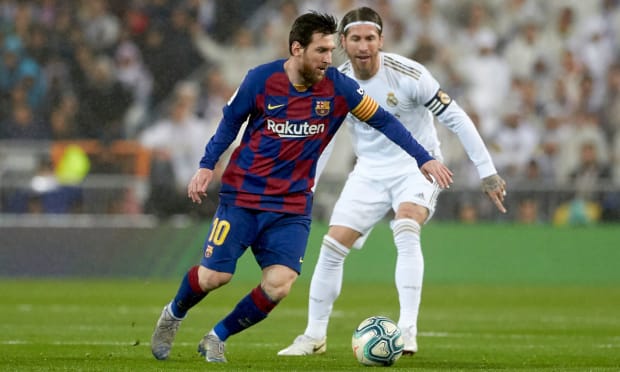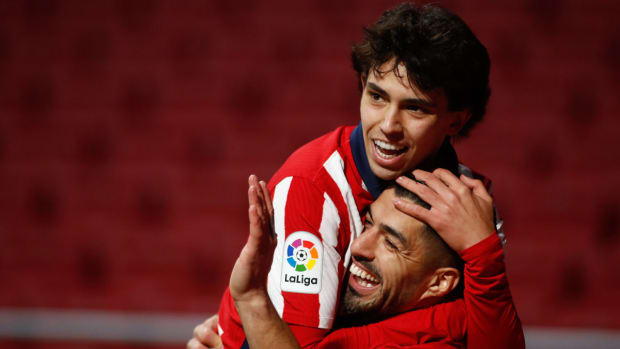Lionel Messi is off to PSG, as is Sergio Ramos, and the Spanish League is at war with its two top clubs. So where does it go from here, on the dawn of a new season?
Six thousand fifty-six days.
That’s the duration between Lionel Messi’s first appearance for Barcelona, a 1–0 win over Espanyol in October 2004, and his last, a 2–1 home defeat to Celta Vigo several months ago.
Only one of the 26 other players who saw the pitch on that first day in Barcelona is still rostered anywhere: midfield maestro Andrés Iniesta, who captains Vissel Kobe in Japan’s top flight. (Another, Espanyol center back Mauricio Pochettino, is now Messi’s manager at PSG.)
Messi’s reign at the Camp Nou outlasted just about everything in La Liga: Seven managers at Barcelona (and two Zinedine Zidane stints at rival Real Madrid); league spells of Cristiano Ronaldo, Zlatan Ibrahimović and Neymar; and almost the league structure itself when the 48 hours of the European Super League threatened to change everything. Only six players in history have made more La Liga appearances than Messi. Spanish football and Messi are synonymous, especially in the global market. Despite a contract that was, by all accounts, agreed upon by both the player and club, the league’s salary-cap restrictions ultimately spelled an abrupt end to everything.
Of course, it’s difficult to speculate whether club president Joan Laporta and Barcelona or the league offices are to take the lion’s share of the blame for the mishap. Barcelona’s finances are a well-documented mess, but La Liga also could have relented a bit on its restrictions to make an exception—albeit at the cost of setting a dangerous precedent. Nevertheless, Barcelona and Spain’s top flight are left without the star who has shone brightest for nearly two decades, as Messi has inked a new two-year deal with PSG.

EFE/Alejandro Garcia/Sipa USA
So after its biggest name departs less than a week before the advent of a new season, where does La Liga go from here? It’s a convoluted question muddied by moving parts at both the club and league level. La Liga president Javier Tebas remains optimistic, though whether he is being realistic remains to be seen after seeing a third transcendent star leave in a four-year span.
“We always want the best players in the Spanish league,” Tebas said this week. “Neymar left, Cristiano Ronaldo left, Messi left. They matter, they help, but they are not indispensable. We will keep growing and I have no doubt that we will move closer to the Premier League despite not having Messi.”
A multibillion-dollar deal between the league and private equity group CVC was approved this week by 38 of 42 teams in the top two flights of Spanish football. Spain’s two richest clubs, Messi’s Barcelona and rival Real Madrid, are allowed to opt out of the deal should they choose, given their opposition to the lengthy broadcast rights that would tie the teams down for 50 years. More holistically, the deal would hinder their continued efforts to launch a European Super League.
The Super League’s inception and immediate folding back in April deterred all but three clubs from continued pursuit of such a competition: Italian power Juventus, Barcelona and Real Madrid. Led by Real Madrid president Florentino Pérez, the two Spanish squads are still battling their own domestic league in an attempt to keep their Super League dream alive and have threatened legal action against Tebas and La Liga. “Our aim is to keep developing the Super League project in a constructive and cooperative manner,” said a statement from Barcelona in late July.
Since Messi’s arrival, the league has changed drastically along with the rest of the football world. La Liga’s revenue in the 2004–05 season reached just over €1 billion for the first time in history, the fourth-highest in the world. Last season, it raked in €3.7 billion, second to only England’s Premier League. The sport is continuing its arc of global growth, and so is La Liga, emphasized by the pretty penny ESPN paid to secure the U.S. broadcast rights for the next eight years. The move to a more visible platform in the U.S. is all part of La Liga’s quest to secure a larger portion of the North American market.
Those same two Spanish giants that are hell-bent on altering the structure of European competition towered over the rest of Europe in the 2010s, winning six of eight Champions League titles from ’10 to ’18. But neither club has reached a final since then.
Now, Spanish football is losing the generational superstar that last season, led the league in expected goals (and actual goals), expected assists, progressive passes and shot-creating actions at age 33. It’ll miss the best player to ever grace a pitch in Spain, as well as the brand that follows him (his 246 million followers on Instagram are second to only Ronaldo).
In deciphering where this leaves La Liga, it’s best to start with its two largest clubs. In those years of European dominance, either La Blaugrana or Los Blancos won every league title from 2004 to ’19 except one—2013–14, when Atlético made a late charge led by Diego Costa. Now, two of the players who defined the last decade of that storied rivalry—Messi and former Real Madrid center back Sergio Ramos—are teaming up in Paris.

pressinphoto/Sipa USA
Without Messi, Barcelona appears to be a club in some level of distress. Laporta won an election partly on the promise that he could keep the superstar. Instead, he’s left with €1.2 billion in debt, including a loss of a half billion dollars just last season, all while the team plots an expensive redevelopment of Camp Nou. Among the club’s summer signings via free transfer was the aging (and Messi’s best friend and compatriot) Sergio Agüero, only for him to suffer an injury and be forced out for the first 10 weeks of the upcoming season.
While the production line at La Masia is still churning out young talents like Pedri and Ansu Fati, Frenchman Antoine Griezmann will need to step up to fill the Messi-sized hole in the attack. He hasn’t quite lived up to his €112 million transfer fee thus far, he certainly has the talent to do so. The glass-half-full outlook would suggest that with Messi gone, he can do more to replicate his previous success at Atlético Madrid. In addition to the outlay on Griezmann that has yet to pay off, the club’s biggest issues lie in a curious transfer-market record and commitment to outlandish wages that have primarily contributed to the degree of debt in which it finds itself.
Barcelona spent north of €250 million on Philippe Coutinho and Ousmane Dembélé in the last four years, reinvesting the windfall from the 2017 Neymar-to-PSG transfer windfall in a pair of attackers who have not held up their end of the bargain on a consistent basis. Now, the club is in such a deep hole that it may not have the funds to even register its three free transfers of the summer: Agüero, forward Memphis Depay and defender Eric García. Those financial rules that hindered Messi’s re-signing are forcing Barcelona to significantly reduce its wage bill or risk being even more shorthanded.
Travel roughly 300 miles west to Madrid, and the situation isn’t quite as dire, but the winds of change are still blowing. The club will be without its defensive anchor, Ramos, for the first time since 2005. Zidane ended his second spell as manager in May, and former boss Carlo Ancelotti has stepped in for a second time. In addition to welcoming back its top attacking talent led by Karim Benzema, Madrid has brought in versatile center back David Alaba, who arrived from Bayern Munich on a free transfer.

Oscar J Barroso/Spain DPPI/DPPI/LiveMedia/Sipa USA
Until proven otherwise, though, the road to the league title will run through crosstown rival Atlético Madrid. It has one of La Liga’s most prolific players in Luis Suárez, one of its best young players in João Félix and its most formidable defense led by goalkeeper Jan Oblak. Its title defense marks a rarity that it isn’t Barcelona or Real Madrid that is the reigning champion. That it coincides with the departure of two of their—and La Liga’s—biggest stars is no coincidence.
With Messi gone, who will fill that role of the league’s most important—and marketable—player? There are the established forwards like Suárez, Griezmann and Benzema. There are the rising talents like Pedri and Real Madrid’s Vinicius Junior and others. No matter who takes that title, there will assuredly be nobody that compares to Messi.
That’s not to say there won’t be exciting football played in Spain. This year’s title race should be just as open as last season’s, with the three largest clubs still the favorites and teams like Sevilla possessing the talent to challenge. That said, a changing of the guard is still here. Messi left a club and league without its centerpiece and identity of the last 15 years. A league at war with its two most important teams is left to pick up the pieces.
More Soccer Coverage: